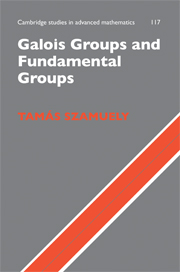5 - Fundamental groups of schemes
Published online by Cambridge University Press: 05 August 2012
Summary
Though the theory of the previous chapter is sufficient for many applications, a genuine understanding of the algebraic fundamental group only comes from Grothendieck's definition of the fundamental group for schemes. His theory encompasses the classification of finite covers of complex algebraic varieties of any dimension, Galois theory for extensions of arbitrary fields and even notions coming from arithmetic such as specialization modulo a prime. Moreover, it is completely parallel to the topological situation and clarifies the role of base points and universal covers – these have been somewhat swept under the carpet in the last chapter. In his original account in [29] Grothendieck adopted an axiomatic viewpoint and presented his constructions within the context of ‘Galois categories’. Here we choose a more direct approach, emphasizing the parallelism with topology. The background from algebraic geometry that is necessary for the basic constructions will be summarized in the first section. However, the proofs of some of the deeper results discussed towards the end of the chapter will require more refined techniques.
The vocabulary of schemes
In this section we collect the basic notions from the language of schemes that we shall need for the development of Grothendieck's theory of the fundamental group. Our intention is to summarize for the reader what will be needed; this concise overview can certainly not replace the study of standard references such as [34] or [64], let alone Grothendieck's magnum opus EGA.
Information
- Type
- Chapter
- Information
- Galois Groups and Fundamental Groups , pp. 142 - 205Publisher: Cambridge University PressPrint publication year: 2009
